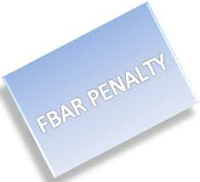On August 7, 2018 we posted Court of Claims Rejects Colliot & Wadhan: Willful FBAR Penalty Not Limited to $100,000, where we discussed that July 31, 2018 in Norman v. United States, Ct. Fed. Cl. Dkt 15-872, the Court held that the taxpayer Norman was liable for the FBAR willful penalty and this Court rejected the Colliot holding that the FBAR willful penalty was limited to a maximum of $100,000, because the regulations had not been changed to reflect the statutory amendment increasing the maximum FBAR willful penalty. Now another DC court has also rejected Colliot & Wadhan and concluded that the Willful FBAR Penalty Not Limited to $100,000 in Rum, (DC FL 8/2/2019) 124 AFTR 2d ¶2019-5113
A federal magistrate has recommended that a reg,which imposes a lower penalty for willful failure to file an FBAR than a more recent statute, be found invalid.
Under 31 USC 5314(a), every U.S. person that has a financial interest in, or signature or other authority over, a financial account in a foreign country must report the account to IRS annually on a FinCEN Report 114, Report of Foreign Bank and Financial Accounts (commonly referred to as an FBAR).
The penalty for violating the FBAR requirement is set forth in 31 USC 5321(a)(5). 31 USC 5321(a)(5)(A) provides that the Secretary of the Treasury may impose a civil money penalty on any person who violates, or causes any violation, of 31 USC 5314(a). The maximum amount of the penalty depends on whether the violation was non-willful or willful. The maximum penalty amount for a nonwillful violation of the FBAR requirements is $10,000. (31 USC 5321(a)(5)(B)(i)) The maximum penalty amount for a willful violation "shall be increased to the greater of" $100,000 or 50% of the balance in the account at the time of the violation. (31 USC 5321(a)(5)(C), 31 USC 5321(a)(5)(D))
The penalty amounts described above reflect a 2004 law change that increased the maximum civil penalties that can be assessed for willful failure to file an FBAR. Before that change, the maximum willful penalty was $100,000. Regs that were promulgated before the statutory increase continue to reflect the former $100,000 maximum (as opposed to the "greater of $100,000 or 50%..."), even though these regs have since been renumbered and amended to account for inflation. (31 C.F.R. 1010.820(g); "the reg")
The Treasury Department has delegated the authority to enforce the assessment of civil FBAR penalties to the IRS. (31 CFR 1010.810(g); IR 2003-48)
A Texas district court held that 31 CFR 1010.820(g) can be applied consistently with 31 USC 5321(a)(5), and thus the reg has not been implicitly invalidated or superseded. The court therefore limited the penalty to the $100,000 limit in the reg. (Colliot, (DC TX 2018) 121 AFTR 2d 2018-1834) and a Colorado district court came to the same conclusion. (Wadhan, (DC CO 7/18/2018) 122 AFTR 2d 2018-5208)
The Court of Federal Claims, said that Colliot was wrongly decided and that the reg was invalid. (Norman, (Ct Fed Cl 7/31/2018) 122 AFTR 2d 2018-5089)
Crucially, the court said, the amended statute dictates that the usual maximum penalty "shall be increased" to the greater of $100,000 or 50% of the account. (31 USC 5321(a)(5)(C)(i)) Congress used the imperative, "shall," rather than the permissive, "may." Therefore, the amendment did not merely allow for a higher "ceiling" on penalties while allowing the Treasury Secretary to regulate under that ceiling at his discretion. Rather, Congress raised the new ceiling itself, and in so doing, removed the Treasury Secretary's discretion to regulate any other maximum.
The court said that "in order to be valid, regs must be consistent with the statute under which they are promulgated." Because 31 USC 5321(a)(5)(C)(i) mandates that the maximum penalty be set to the greater of $100,000 or 50% of the balance of the account, the reg is no longer consistent with the amended statute.
The IRS had found that Said Rum failed to file an FBAR for the 2007 tax year, and that the failure was willful. The account balance in question was over $1 million and the IRS assessed a 50% penalty under 31 USC 5321.
Rum argued that the maximum penalty should only be $100,000 as per 31 CFR §1010.820(g).
A federal magistrate, looking at Colliot, Wadhan, and Norman, found that 31 USC § 5321 has superseded 31 CFR §1010.820(g)(2). The magistrate found the reasoning of Norman persuasive and recommended that the reg be found to be no longer valid.
Have Undeclared Income from an Offshore Bank Account?
Been Assessed a 50% Willful FBAR Penalty?
Contact the Tax Lawyers at
Marini& Associates, P.A.
for a FREE Tax Consultation
Toll Free at 888-8TaxAid (888) 882-9243











